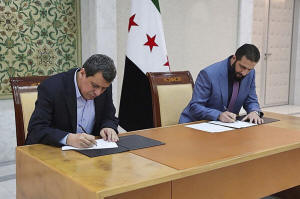Syria's government signs a breakthrough deal with Kurdish-led
authorities in the northeast
[March 11, 2025]
By BASSEM MROUE, KAREEM CHEHAYEB and OMAR ALBAM
JABLEH, Syria (AP) — Syria's interim government signed a deal Monday
with the Kurdish-led authority that controls the country’s northeast,
including a ceasefire and the merging of the main U.S.-backed force
there into the Syrian army.
The deal is a major breakthrough that would bring most of Syria under
the control of the government, which is led by the Islamist group Hayat
Tahrir al-Sham that led the ouster of President Bashar Assad in
December.
The deal was signed by interim President Ahmad al-Sharaa and Mazloum
Abdi, the commander of the U.S.-backed, Kurdish-led Syrian Democratic
Forces.
The deal to be implemented by the end of the year would bring all border
crossings with Iraq and Turkey, airports and oil fields in the northeast
under the central government's control. Prisons where about 9,000
suspected members of the Islamic State group are also expected to come
under government control.
Syria’s Kurds will gain their “constitutional rights" including using
and teaching their language, which were banned for decades under Assad.
Hundreds of thousands of Kurds, who were displaced during Syria's nearly
14-year civil war, will return to their homes. Thousands of Kurds living
in Syria who have been deprived of nationality for decades under Assad
will be given the right of citizenship, according to the agreement.
The deal also says all Syrians will be part of the political process, no
matter their religion or ethnicity.

Syria’s new rulers are struggling to exert their authority across the
country and reach political settlements with other minority communities,
notably the Druze in southern Syria.
Earlier on Monday, Syria's government announced the end of the military
operation against insurgents loyal to Assad and his family in the worst
fighting since the end of the civil war.
The Defense Ministry's announcement came after a surprise attack by
gunmen from the Alawite community on a police patrol near the port city
of Latakia on Thursday spiraled into widespread clashes across Syria's
coastal region. The Assad family are Alawites.
“To the remaining remnants of the defeated regime and its fleeing
officers, our message is clear and explicit,” said Defense Ministry
spokesperson Col. Hassan Abdel-Ghani. “If you return, we will also
return, and you will find before you men who do not know how to retreat
and who will not have mercy on those whose hands are stained with the
blood of the innocent.”
Abdel-Ghani said security forces will continue searching for sleeper
cells and remnants of the insurgency of former government loyalists.
[to top of second column]
|

In this photo released by Syrian state news agency SANA, Syria's
interim President Ahmad al-Sharaa, right, and Mazloum Abdi, the
commander of the U.S.-backed Kurdish-led Syrian Democratic Forces,
sign a deal in Damascus, Syria, Monday, March 10, 2025. (SANA via
AP)

Though the government's counter-offensive was able to largely
contain the insurgency, footage surfaced of what appeared to be
retaliatory attacks targeting the broader minority Alawite
community, an offshoot of Shia Islam whose adherents live mainly in
the western coastal region.
Sajid Allah Al-Deek, a security official in the coastal region, told
The Associated Press that security forces were deployed in the area
from the Latakia governorate to Jableh and that the coastal highway
is functioning again after being closed because of the fighting.
“The civilians have begun returning to their homes,” Al-Deek said,
adding that authorities have started detaining those blamed for acts
of violence.
Imad Baytar said his father, who worked for a taxi company, had gone
from Jableh to Damascus and on his way back over the weekend "he was
killed in the checkpoint.” Baytar blamed Assad supporters for the
killing.
The Syrian Observatory for Human Rights, a Britain-based war
monitor, said 1,130 people were killed in the clashes, including 830
civilians. The AP could not independently verify these numbers.
Al-Sharaa said the retaliatory attacks against Alawite civilians and
mistreatment of prisoners were isolated incidents, and vowed to
crack down on the perpetrators as he formed a committee to
investigate.
Still, the events alarmed Western governments, who have been urged
to lift economic sanctions on Syria.
U.S. Secretary of State Marco Rubio in a statement Sunday urged
Syrian authorities to “hold the perpetrators of these massacres”
accountable. Rubio said the U.S. “stands with Syria’s religious and
ethnic minorities, including its Christian, Druze, Alawite, and
Kurdish communities.”
___
Mroue and Chehayeb reported from Beirut.
All contents © copyright 2025 Associated Press. All rights reserved
 |